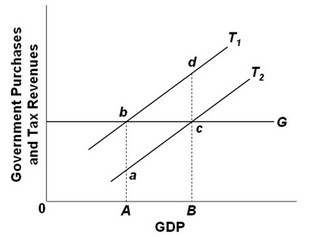Economists refer to the actions people take after they have entered into a transaction that makes the other party to the transaction worse off as
A) economic inefficiency. B) moral hazard.
C) market failure. D) bad faith.
B
You might also like to view...
The greater the degree of economic integration between markets in the home country and the base country:
A) the greater the volume of transactions and the greater the benefit to the home country of fixed exchange rates. B) the smaller the volume of transactions and the lesser the benefit to the home country of fixed exchange rates. C) the greater the volume of transactions and the greater the benefit to the home country of flexible exchange rates. D) the less important the volume of transactions and the greater the importance of ethnic similarities.
 Refer to the above diagram. Assume that G and T2 are the relevant curves, the economy is currently at A, and the full-employment GDP is B. This economy has a(n):
Refer to the above diagram. Assume that G and T2 are the relevant curves, the economy is currently at A, and the full-employment GDP is B. This economy has a(n):
A. cyclically adjusted budget deficit. B. actual budget deficit. C. cyclically adjusted budget surplus. D. actual budget surplus.